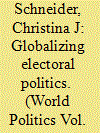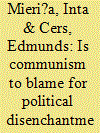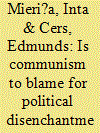| Srl | Item |
| 1 |
ID:
165491


|
|
|
|
|
| Summary/Abstract |
In federal political systems such as the United States, there has long existed a view that citizens should be more politically competent at the local level than at the federal level of government. Recent studies have challenged this view. This article argues that these findings may reflect only one part of the broader picture. Through a review of two recent studies, I contend that research in this realm must consider more than only the level of government. Odd as this sounds, assumptions about varying levels of political competence at different levels of government have always been premised on the notion that local-level politics is smaller and less complex than federal-level politics. However, when local politics takes place today against the backdrop of small villages and towns as well as in large cities, these are assumptions that must be reevaluated.
|
|
|
|
|
|
|
|
|
|
|
|
|
|
|
|
| 2 |
ID:
121908


|
|
|
|
|
| Publication |
2013.
|
| Summary/Abstract |
This article analyzes electoral cycles in distributional bargaining in the European Union. The author argues that governments attempt to increase their EU membership benefits above average levels in the preelection period, hoping to appear politically competent to voters. The theory discusses when and how EU members can increase these gains before elections through negotiations in the Council of Ministers. A time-series cross-sectional analysis of EU member states' annual budget negotiations from 1977 to 2006 supports the existence of conditional electoral cycles in distributional bargaining and generally points to the importance of accounting for such cycles when analyzing patterns of international cooperation.
|
|
|
|
|
|
|
|
|
|
|
|
|
|
|
|
| 3 |
ID:
132938


|
|
|
|
|
| Publication |
2014.
|
| Summary/Abstract |
In this article, we apply a new, original technique of cohort analysis to test empirically whether political disenchantment in the post-communist countries of Central and Eastern Europe can be linked to the previous political culture. On the basis of International Social Survey Programme 1996 and 2006 data we find a surprisingly similar and unique cohort effect in all analysed post-communist countries, reflecting persistent generational differences in perceived political competence (interest and understanding of political processes). However, the communist legacy does not seem to be important for explaining low self-efficacy or distrust in political authorities and their responsiveness to citizens' demands.
|
|
|
|
|
|
|
|
|
|
|
|
|
|
|
|
| 4 |
ID:
133748


|
|
|
|
|
| Publication |
2014.
|
| Summary/Abstract |
In this article, we apply a new, original technique of cohort analysis to test empirically whether political disenchantment in the post-communist countries of Central and Eastern Europe can be linked to the previous political culture. On the basis of International Social Survey Programme 1996 and 2006 data we find a surprisingly similar and unique cohort effect in all analysed post-communist countries, reflecting persistent generational differences in perceived political competence (interest and understanding of political processes). However, the communist legacy does not seem to be important for explaining low self-efficacy or distrust in political authorities and their responsiveness to citizens' demands.
|
|
|
|
|
|
|
|
|
|
|
|
|
|
|
|